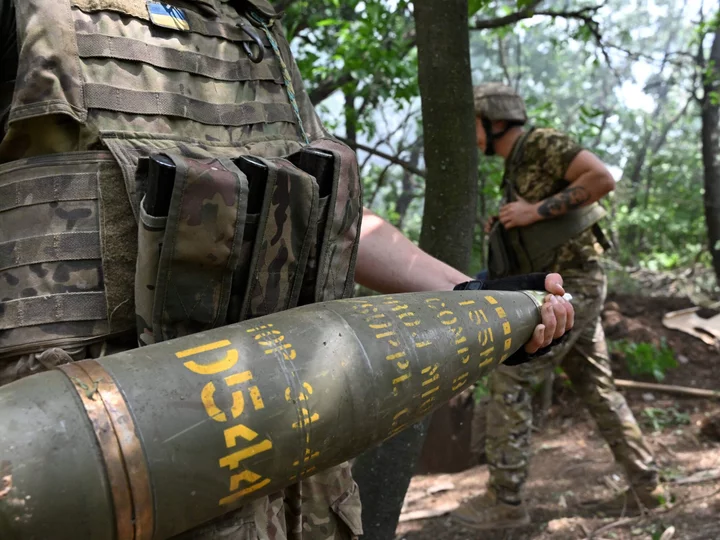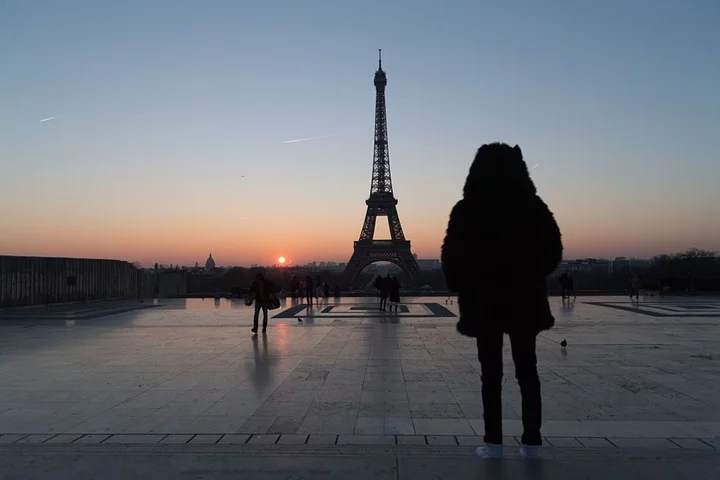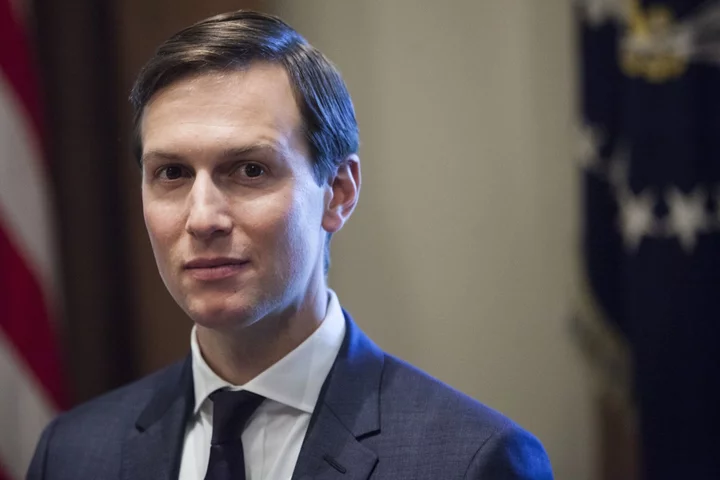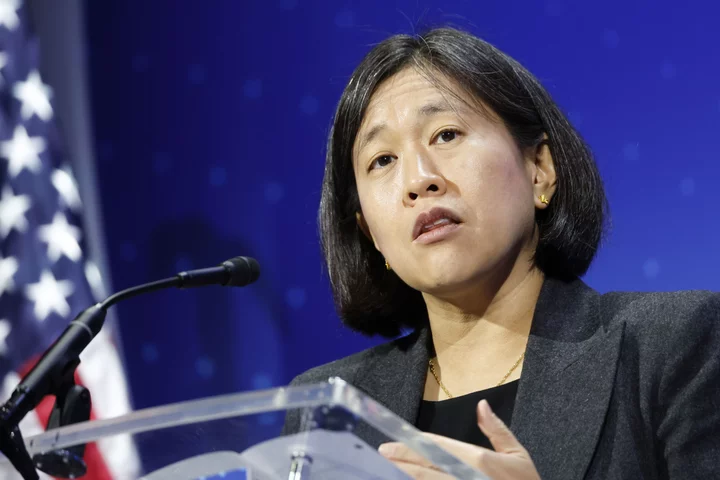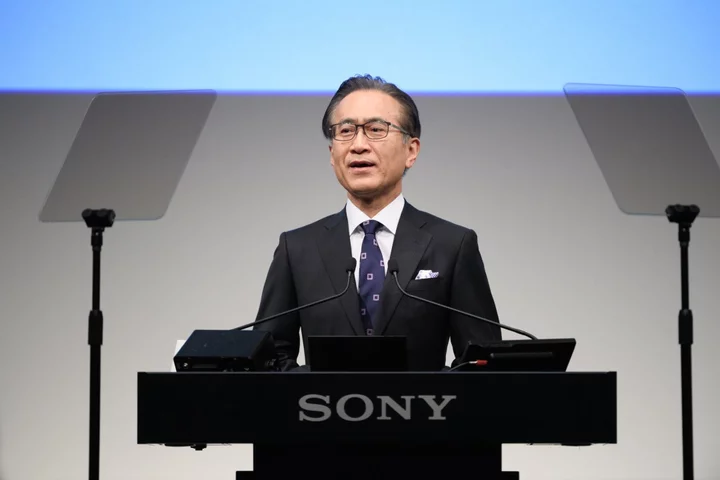President Joe Biden said Vladimir Putin has been weakened by Yevgeny Prigozhin’s failed rebellion, as the Russian leader stepped up his effort to portray the mercenary leader as corrupt.
“I know he is,” Biden told reporters at the White House in response to whether Putin is weaker after the most serious threat to his nearly quarter century in power. “He’s losing the war at home, and he has become a bit of a pariah around the world.”
Germany’s Chancellor Olaf Scholz agreed that Putin has been weakened, saying “there are cracks in the autocratic structures, the power structures, and that he is by no means sitting as solidly and firmly in the saddle.
As many in Russia’s elite have been shocked at Putin’s failure to prevent the mutiny attempt, the Kremlin chief is on a campaign to undercut any sympathy toward Prigozhin, a one-time ally and chief of the Wagner Group, and show he’s firmly in control.
Latest Coverage
- US Backs $15 Billion Sale of Patriot Missile Defenses to Poland
- Putin Says He’s Back in Control But Russia’s Elite Isn’t So Sure
- Russians Greeted Wagner Mutiny With a Shrug and Internet Jokes
- Aborted Russia Mutiny Boosts Support for More US Arms to Ukraine
- Wagner’s Mutiny Creates New Questions About Its Business Empire
All times CET
German Defense Chief Discusses Ukraine’s NATO Prospects (1:08 a.m.)
German Defense Minister Boris Pistorius said there “wasn’t a clear date” regarding Ukraine’s possible membership in NATO, adding “that there is the view that the future of Ukraine is in NATO is enough.”
Pistorius, on a visit to Washington Wednesday, also commented on the aftermath of Prigozhin’s attempted revolt. “What happened in Russia and what’s still going on has to concern us. We had very good meetings with Lloyd Austin and Jake Sullivan,” he said, referring to the US Defense secretary and Biden’s national security advisor.
Scholz Says Germany’s Goal Isn’t Regime Change in Russia (8:22 p.m.)
Scholz said the situation in Russia remains on edge and that Germany would proceed cautiously. “Russia is a nuclear power,” he said in an interview with public broadcaster ZDF. “Therefore we always have to look carefully when dangerous situations arise — and this is a dangerous situation.”
After breaking with Germany’s tradition of staying out of conflict zones, Scholz has positioned Europe’s largest economy as one of Ukraine’s top supporters, supplying tanks and other heavy weapons along with financial aid. “It is necessary to say clearly: we support Ukraine so that it can defend itself,” he said, adding that “the aim of our support for Ukraine is not regime change in Russia.”
Putin Promotes Domestic Tourism With No Mention of Mutiny (7:43 p.m.)
Putin visited Russia’s Dagestan region on the Caspian Sea to discuss domestic tourism with officials as the Kremlin seeks to show it’s returning to business as usual.
Putin made no mention of the weekend’s upheaval in his televised opening comments, which highlighted the surge in domestic tourism after sanctions and other restrictions led to a drop in foreign travel.
Poland to Raise Security on Its Belarus Border (6:51 p.m.)
Poland said it will increase security on its border with Belarus on concern that the presence of the Wagner Group may intensify what it’s calling hybrid warfare with its neighbor.
“We potentially have a new situation in Belarus with the Wagner presence,” Deputy Prime Minister Jaroslaw Kaczynski said at a news conference in Warsaw. “The situation is dangerous for Ukraine, and it’s also potentially dangerous for Lithuania and us.”
Poland estimates that about 8,000 Wagner members will be in Belarus, which may mean a “new phase of hybrid warfare” that is “much more difficult than we observe now,” Kaczynski said.
Biden Says Putin Weakened, Though Unclear How Much (4:10 p.m.)
The US president said it’s unclear to what extent Putin has lost hold on power, even as he expressed confidence that the Russian leader had. “It’s hard to tell, but he is clearly losing the war,” Biden told reporters in brief remarks at the White House.
Biden has said the US and its allies were not behind the revolt. White House officials have repeatedly declined to comment on the power struggle, saying it is an internal Russian matter.
Mercenary Leader Moved Up Plot After It Was Discovered, WSJ Reports (2 p.m.)
Prighozin’s mutiny was aimed at capturing Russian military leaders – and was moved forward after the plot was discovered by the Kremlin’s domestic intelligence service, the Wall Street Journal reported, citing unnamed western officials.
The mercenary leader’s original plan involved seizing Russian Defense Minister Sergei Shoigu and armed forces chief Valery Gerasimov during a visit to southern Russia, the newspaper said. Russia’s Federal Security Service, known as the FSB, laid bare the plot two days before it was to be executed, potentially explaining Prigozhin’s decision to march on Moscow, it reported.
Ukraine Calls for Russia to Be Seen as High-Risk Jurisdiction (1:51 p.m.)
Putin’s acknowledgment that the Kremlin financed the Wagner mercenary group should prompt the international community to recognize Russia as a high-risk jurisdiction and issue relevant market advisories to “avoid contributing to financing terrorism and organized crime,” Ukraine’s Finance Ministry said.
Wagner Group is designated as a terrorist organization by Estonia, Lithuania, and the French parliament, while the US has sanctioned Wagner Group as a Transnational Criminal Organization, the ministry said. Ukraine is seeking to make Russia a financial pariah state, and The Financial Action Task Force, an inter-governmental organization that sets standards for combating dirty money, suspended Russia from membership in February.
Zelenskiy Urges NATO to Stop Looking at the Kremlin (12:47 p.m.)
Zelenskiy urged the North Atlantic Treaty Organization to stop looking at a weakened Kremlin in their deliberations on Ukraine’s membership and reiterated his country’s resolve to join the alliance as well as the European Union.
“It is absurd to look back at an incapable leader,” he said. “Even Russia’s internal forces have stopped looking back at the frail master of Kremlin.”
Ukraine’s victory means liberation of all its territory and it will bring peace and security to countries like Moldova, Georgia and Belarus, Zelenskiy said in a televised speech to parliament. Ukraine won’t accept the war turning into any kind of frozen conflict with Russia, he added.
Read More: Zelenskiy Urges NATO to Disregard Kremlin on Ukraine Membership
Kremlin Calls Report on Mutiny Plans ‘Speculation’ (12:40 p.m.)
Kremlin spokesman Dmitry Peskov said a New York Times report that a top Russian general allegedly knew about Prigozhin’s plans for an insurrection was “speculation,” according to Interfax.
“Around these events there’s a lot of different speculation, gossip and such,” the news service cited Peskov as saying. “I think this is one of those examples.”
Kremlin Gets Expressions of Support From Bahrain (11:10 a.m.)
The Kremlin said Bahraini King Hamad bin Isa Al Khalifa called Putin to express support for his leadership. It’s the latest in a string of statements the Kremlin has received in the last several days from its allies, including the leaders of Turkey, Qatar and Iran.
Putin Belittles Wagner Rebellion Leader the Kremlin Created (9:29 a.m.)
As Prigozhin arrived in Belarus in his private jet from St. Petersburg on Tuesday, Putin was detailing more than $3 billion he said Russia had paid for Wagner’s troops and for food supplied by Prigozhin’s catering company for the Russian army fighting in Ukraine.
“I hope that no one stole anything, or, let’s say, stole just a little, in the course of this work,” Putin told a group of soldiers at the Kremlin. “We will of course look into all this.”
Top General May Have Known of Prigozhin Plan, Report Says (4:05 a.m.)
A top Russian general who has been an ally of Prigozhin knew something of his plans for a rebellion, the New York Times reported, citing anonymous sources.
The newspaper said US officials were trying to determine whether the general, Sergei Surovikin, and other Russian military leaders supported Prigozhin’s move. The officials, according to the Times, think Prigozhin would not have acted unless he believed that he had powerful support.
Surovikin was replaced as commander of Russian forces in Ukraine in January after holding that post since October. Before that, he had been commander-in-chief of Russia’s aerospace forces and led operations in Syria.

